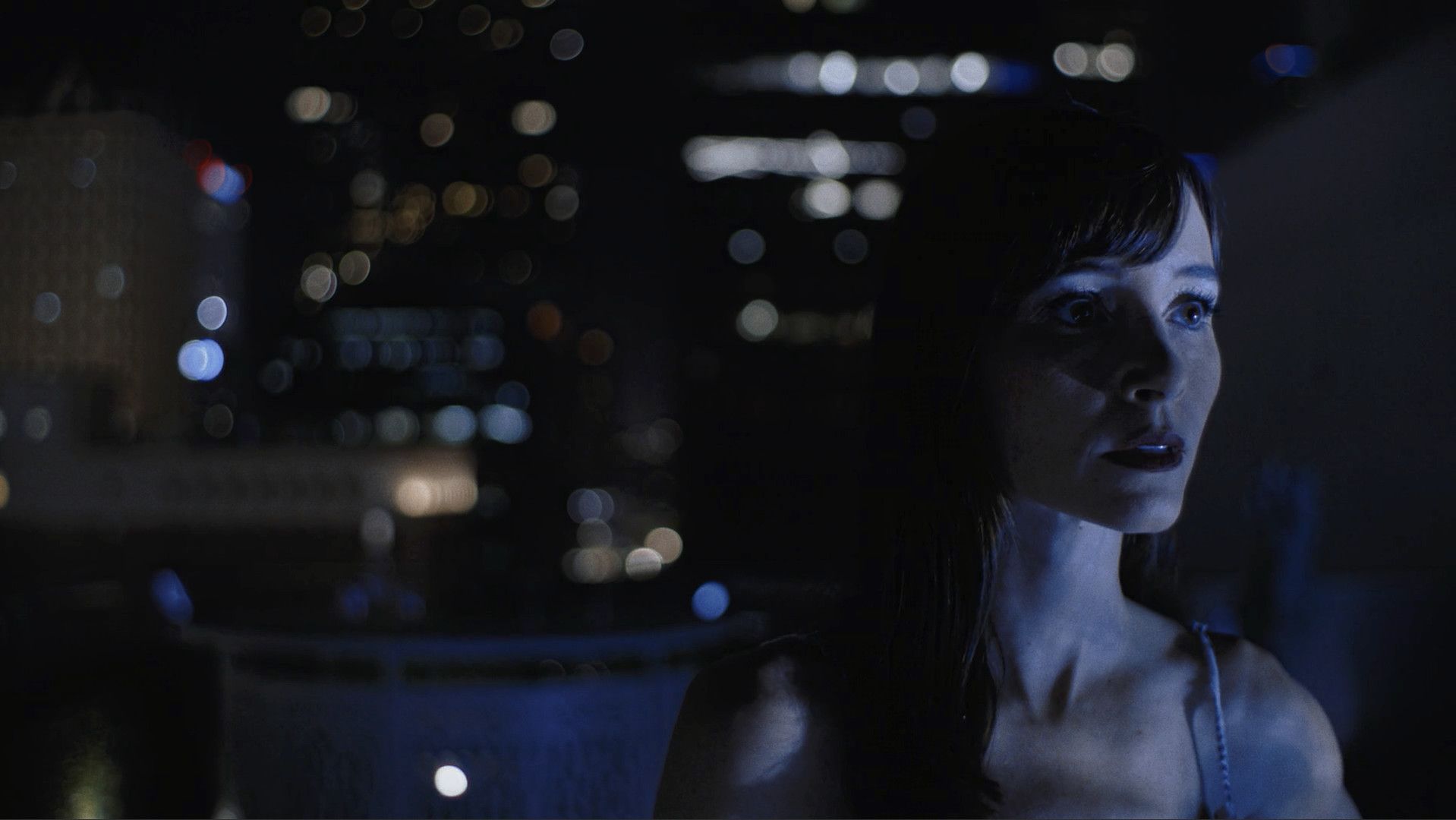Immortality Review: Profound Footage
A phenomenal piece of design

There's a scene in Room 237, Rodney Ascher's wonderful documentary about a community of Kubrick enthusiasts who have devoted themselves to studying The Shining, where one of the analysts recalls seeing a review that describes the movie as one you "watch forwards and backwards". They took this literally, creating The Shining Forwards and Backwards, a version of The Shining that superimposes the film over itself, playing forwards and backwards at the same time. This version of the film is viewed and discussed as a legitimate way of interpreting the work, its neatest coincidences held up as intentional choices made by a director known for being exacting, but not, perhaps, that exacting.
I have thought a lot about The Shining Forwards and Backwards while playing Immortality, a game that you - stay with me here - play forwards and backwards. I do not believe that this is a sensible way to watch The Shining, but Immortality is about the same obsessive drive to really understand something. It's about the act of examining a filmed object from every angle, reading into every moment when an actor glances at something off-camera, exploring the meaning behind what's caught in the reflections of on-screen mirrors, finding meaning in how the moon in one movie matches an eye in another, how a rose can represent a blood stain, how a character looks when they move backwards and what it changes about your understanding of the screen. It's about viewing everything as intentional, and then digging deep into what was driving those intentions.

Immortality is a game about the eternal pursuit of the perfect "reading", and wanting to truly understand something. It's also about something much deeper than any of that; something terrifying and primal and cursed. It takes the FMV game - a genre that has made something of a comeback in recent years - and turns it into something shocking and modern, a game about watching film that uses both media forms in bold, innovative ways. It's unquestionably a masterpiece.
Immortality is the latest game from director and writer Sam Barlow, and feels like the final part of a loose trilogy of his work, following Her Story and Telling Lies. Both of those games involved sifting through video files via a fictionalised computer interface, using keywords to find new videos and piece together a story. Immortality gives you more information from the jump than either of those games did: you are exploring an archive of footage from the making of three films starring Marissa Marcel, an actor who seemed poised to become a huge star in the early 70s. None of these films were ever released, and now, in the present, you're examining a trove of footage through a digital replication of a moviola, a device first invented in the 1920s to help film editors review footage. An "About" option on the game's start screen explains the conceit without breaking character: you're presented with a cache of footage discovered in 2020, and this software has been designed to preserve her screen appearances and give viewers the first proper look at her three canceled movies.
The footage is a mix of table reads, practice runs, promotional and behind-the-scenes videos, and takes that would have been used in each of the movies. The goal - initially, at least - is to unlock as much of the footage as you can, figuring out what happened during the filming of each feature in the process. Finding new footage is done through an innovative "match cut" system: pause the screen and click on an object, a face, or a piece of scenery, and it'll jump to another piece of footage with a matching piece of mis en scene. As you gather more footage, your sense of Marissa - and the films she starred in - grows deeper. Over time, new questions start to naturally emerge, and the sense of mystery deepens.

The moviola system gives everything an important feeling of tactility: you can jump through the time frame of a piece of footage, you need to manually fast forward and rewind if you want to see a specific part of a scene again, complete with whirring sound effects and sped-up action. This feels fiddly at first, but it's by design: the game wants to evoke a sense of reality in its interface.
The films themselves feel impossibly, immaculately authentic. There's Ambrosio, a late 60s cult film about devotion, religious fanaticism, and the literal devil that is chock full of sex scenes; Minsky, an extremely familiar-feeling 70s erotic thriller set among the New York art scene; and Two of Everything, a gloriously cheesy 1999 thriller that would have found its audience on late-night cable as a camp classic, had it released. The more footage you unlock, the more these films reveal themselves to you, and the more you can revel in Barlow's painstaking attention to detail. The real meat of Immortality is in watching and listening; you're not looking for hidden secrets buried in the frames, or seeking out anything that feels particularly gamey, but rather trying to get things right in your own head. There's a complex web of interpersonal drama and Hollywood bullshit to come to grips with, and the deeper in you go, the more meaning you'll start to see in everything - rewatching the footage you uncovered early in the game when you're near the end might reveal some new dimensions purely because of the knowledge you've accumulated.
Of the three, Minsky is the one that feels most like it actually exists and is being screened in second year film studies classes: it's got a spot-on grimy 70s feel to it, bleak and caustic and with some complicated gender dynamics that would still be prompting debate decades later. Ambrosio is also a strange delight, overwrought and weird as it is, and Two of Everything is just absolutely perfect as a bad-but-fascinating 90s film from a previously beloved director. Going over all of this footage and making sense of what was happening during the productions of each of these three films is a true joy.
Manon Gage, the actor playing Marissa, is a phenomenal find, giving a deeply committed performance as a character whose layers deepen repeatedly the further into the game you get. This is true of every performance in the game - including one that I cannot discuss here that absolutely blew me away - but Gage so beautifully embodies not just Marissa but also every performance she gives. The mystery of what went on with Marissa ebbs and flows: I felt like I had cracked it after 5 hours, and then felt like I was still scratching the surface after 10 hours. Somehow, Gage carries the complicated totality of this complicated figure.

Immortality is, on top of all of this, also deeply frightening. This game gave me nightmares, and my waking life has felt haunted by a particular sound cue that you'll grow intimately familiar with as you play the game. One morning, upon waking, I found myself imagining a match cut between the door out of my bedroom and a particular foreboding doorway in the game; it took me half an hour to coax myself out. Immortality does things, things I dare not talk about lest I risk robbing them of some of their power. It plays with its form without ever breaking the fictional reality established. There will be a moment early on where you, as a player, make a discovery that recontextualises the game, and that discovery is a source of great horror - that's all I will say. You don't need to worry about jump scares or survival mechanics or anything like that: Immortality is psychological horror, and it's a masterclass in using mechanics and filmic language to drive fear.
Immortality defies categorisation, and requires you to slough away several "gamer" expectations and mindsets to get the most out of it. Yet as indebted as it is to decades of cinema, Immortality is still distinctly, definitively, a game, one in which your truest objective is to reach a level of understanding through interpretation. It is not about finding every answer; but rather learning to make peace with that which you can't be sure of. It's about looking again, watching the footage again, reinterpreting and reexamining, sharing your theories in increasingly long messages to other friends who have played it. It's about going forwards, and then backwards, to see what you can learn from that, and what happens when you take that process seriously, when it is, in fact, the only way you can make some sense of the shocking truths you're trying to understand.
This might be the single best detective game ever made. Her Story evoked the feeling of the scene in a mystery movie where the detective views something and slowly removes their glasses as the weight of a discovery sets in; the 11 hours it took me to finish Immortality felt like a much deeper embodiment of this, like I was the main character in a movie about uncovering something truly surprising. It's not just the solutions that you're searching for, but the mysteries themselves; the moments of realisation are profound, and I found myself, in the hours when I wasn't playing, feeling like I really was cracking something important, working towards tangible goals. Sitting down at the computer one afternoon, coffee in hand, ready to solve the case, was one of the most profound moments of protagonist embodiment I've ever experienced.

There's so much more to Immortality that I absolutely cannot talk about. I want to explain the clever thing it does with frame rates, but that would spoil it. I want to delve into the things in Two of Everything that shook me so badly, but I know I shouldn't. I want to talk about how the game pulls off its most shocking reveals, and how cleverly and distinctly it makes use of the language of both video games and film to do so, but it would not be fair to rob players of the moments that meant so much to me, that I didn't see coming.
I could go on. Immortality is a game partly about the pleasures of analysis, and so the instinct to dig deeper and deeper into the game itself is strong. So I'll boil it down to the simplest terms I can: this is a phenomenal piece of design, a deep, harrowing, powerful experience that feels like nothing else I've ever played. Reviewing it by standard gaming review metrics feels petty and arbitrary. If true immortality comes from being remembered and regarded forever, then Immortality may be in with a shot at achieving it.